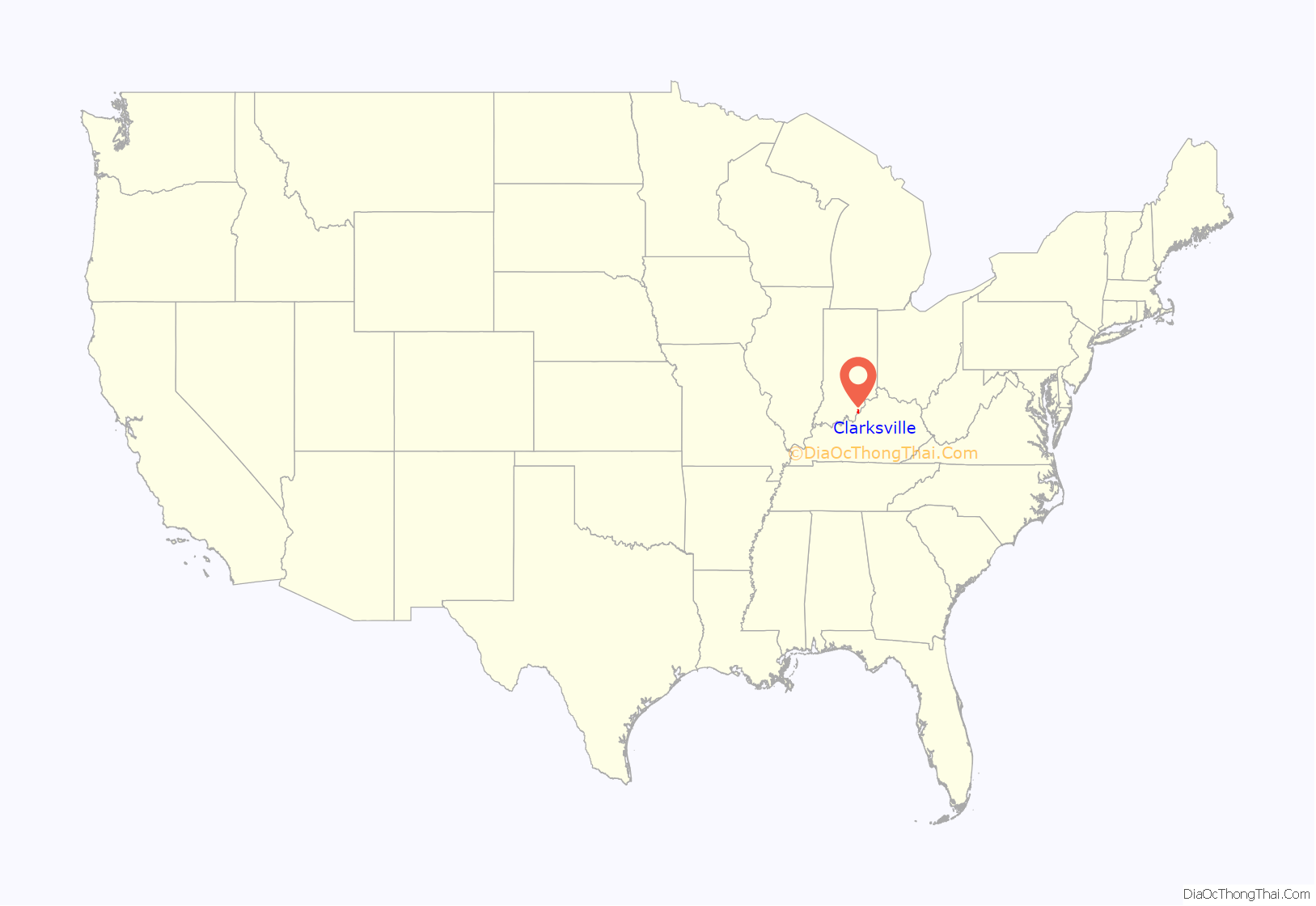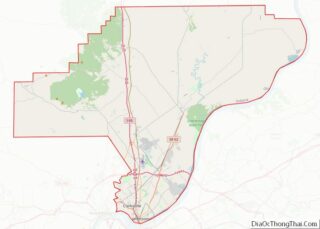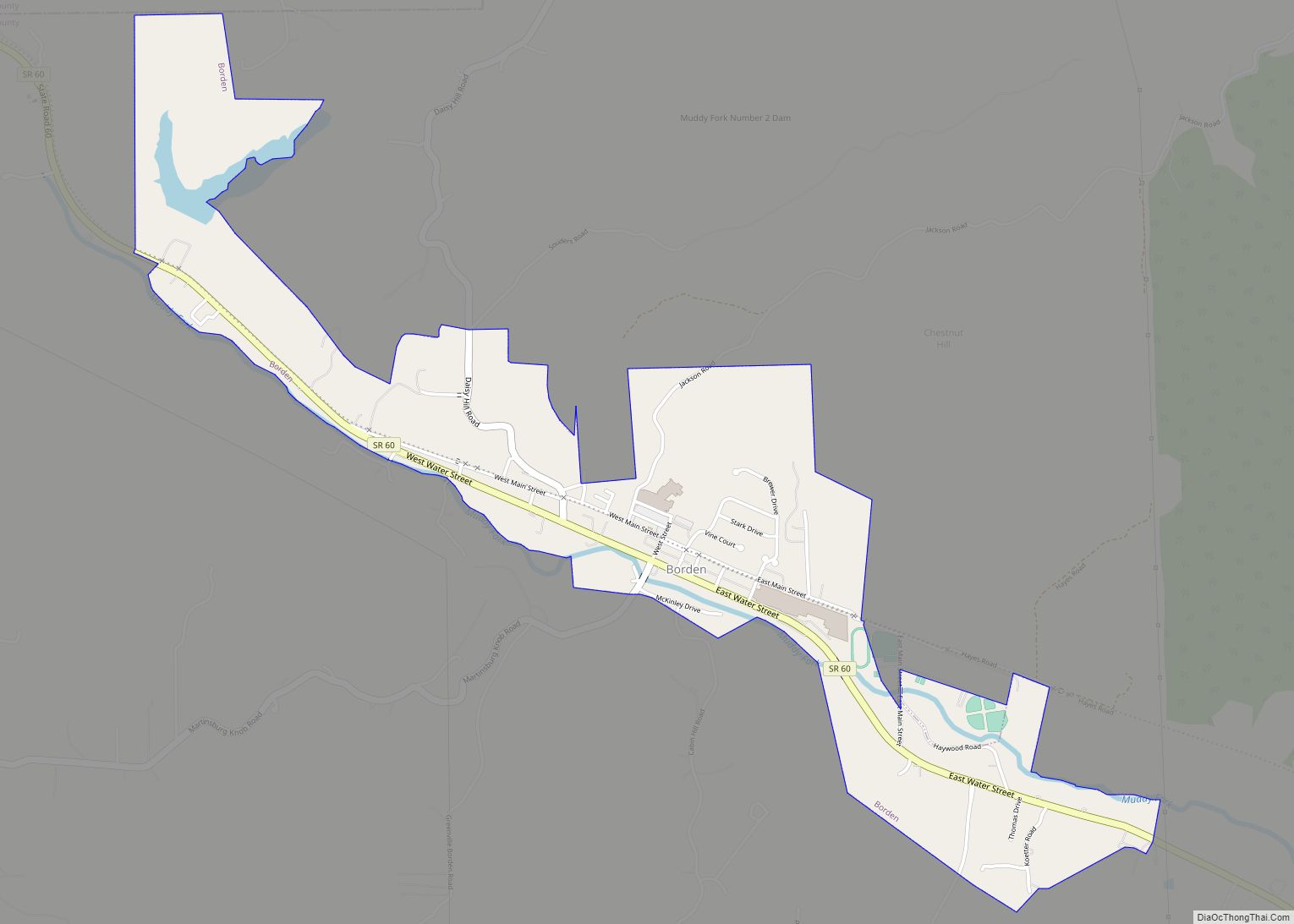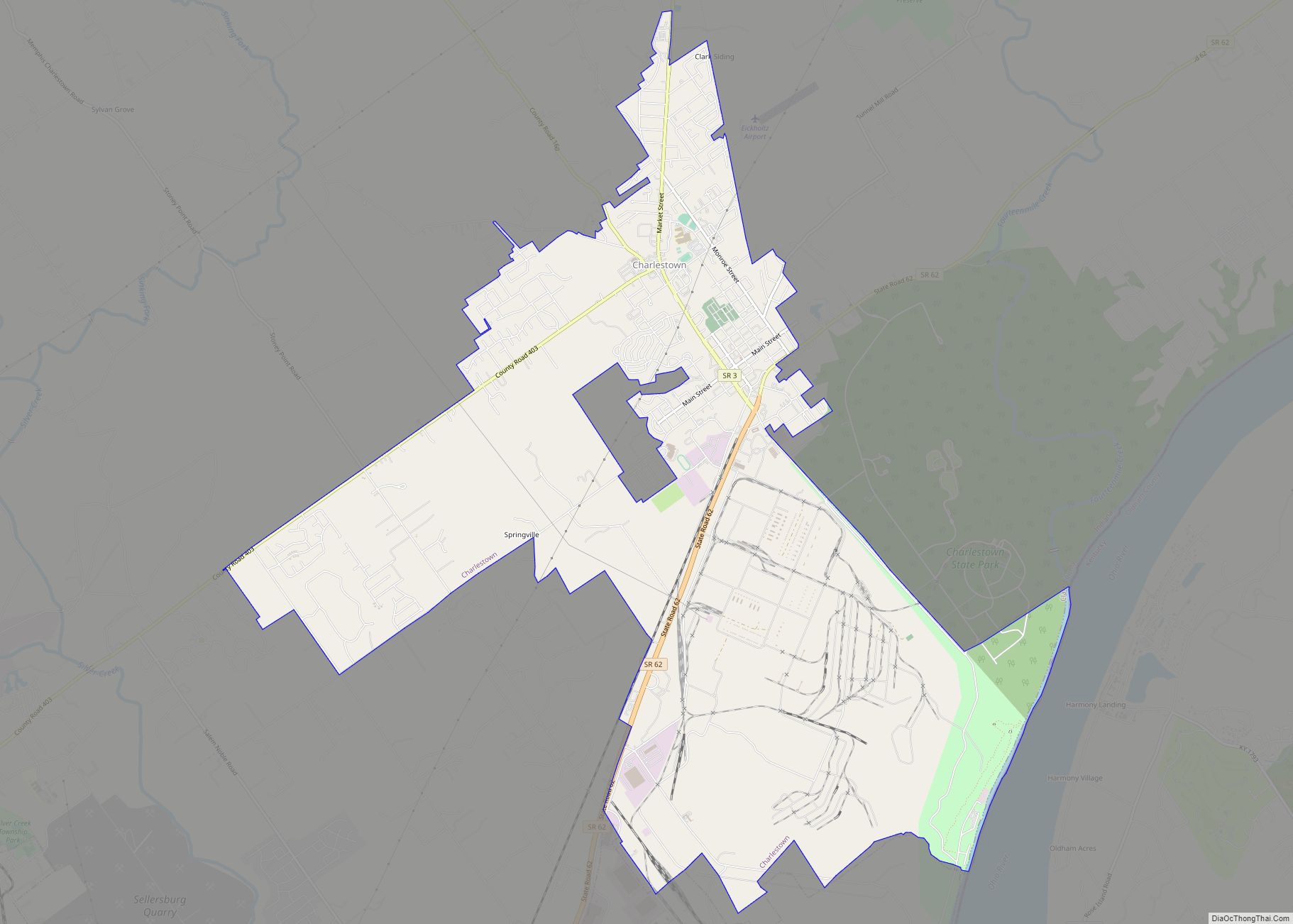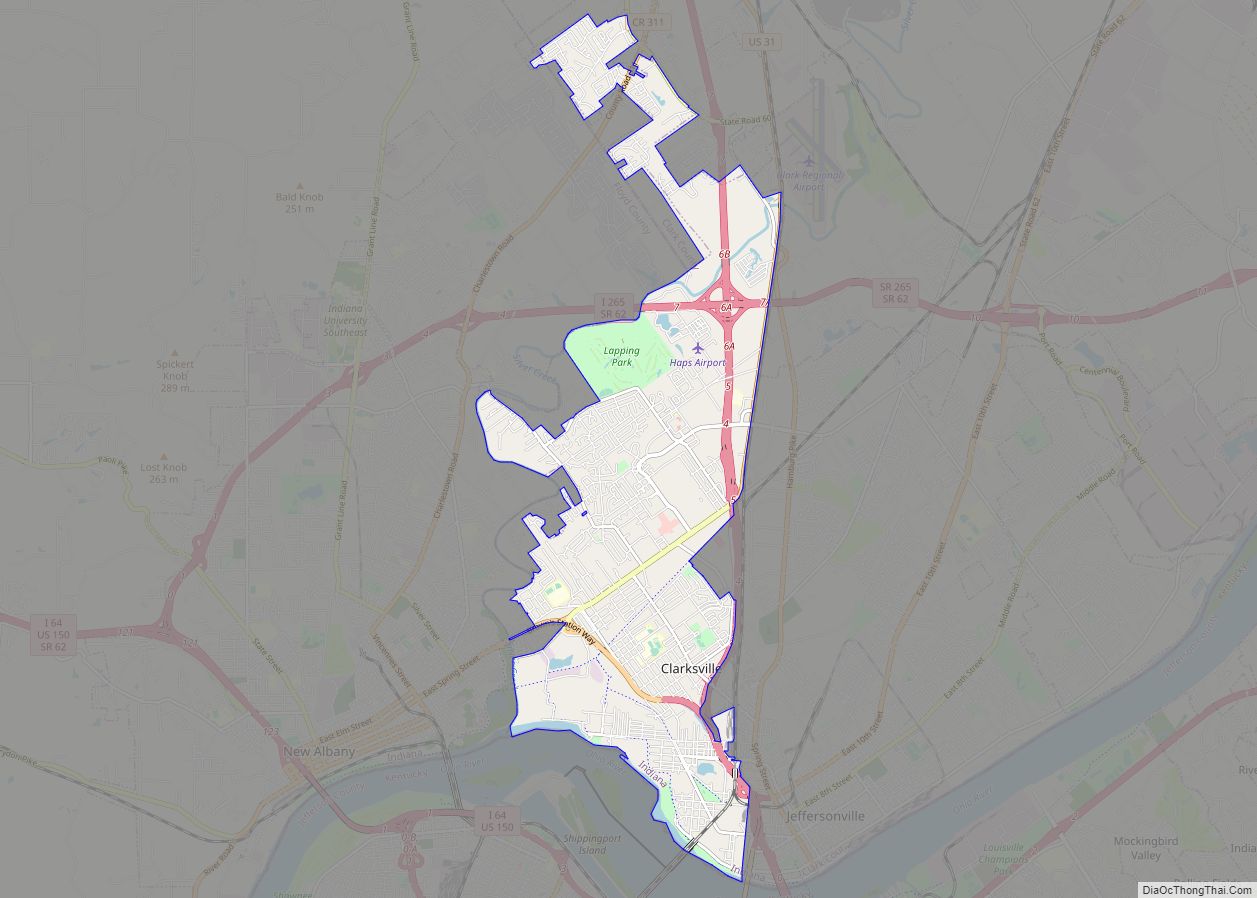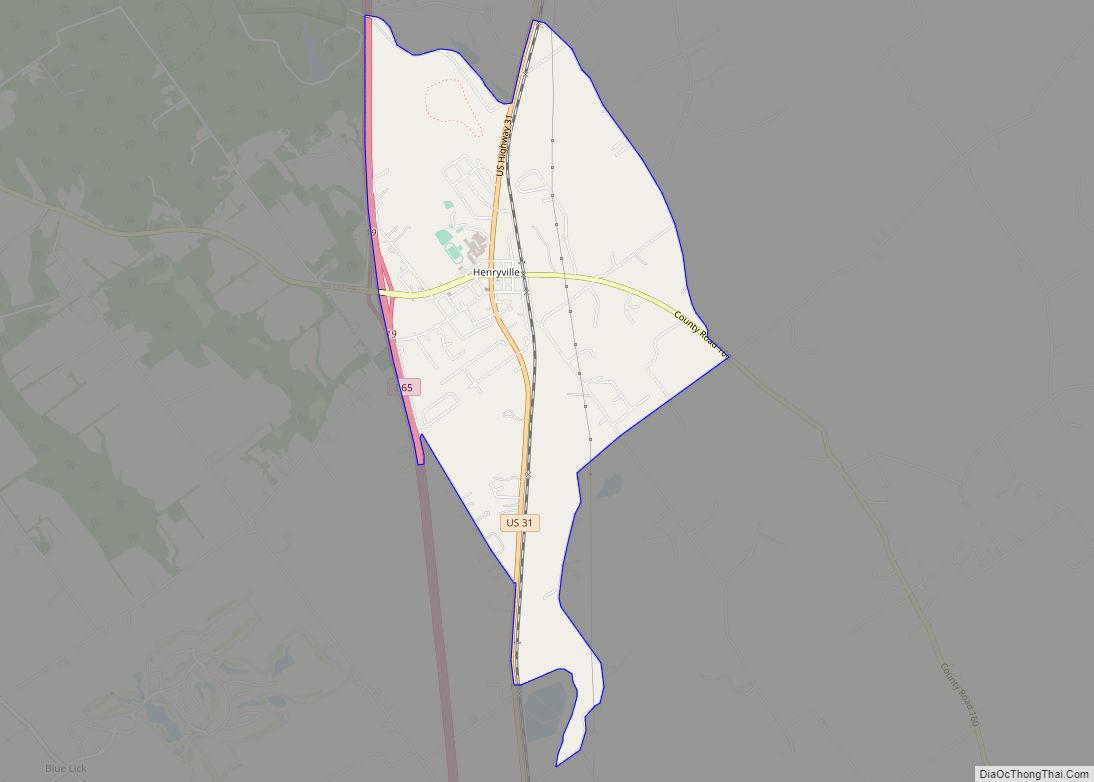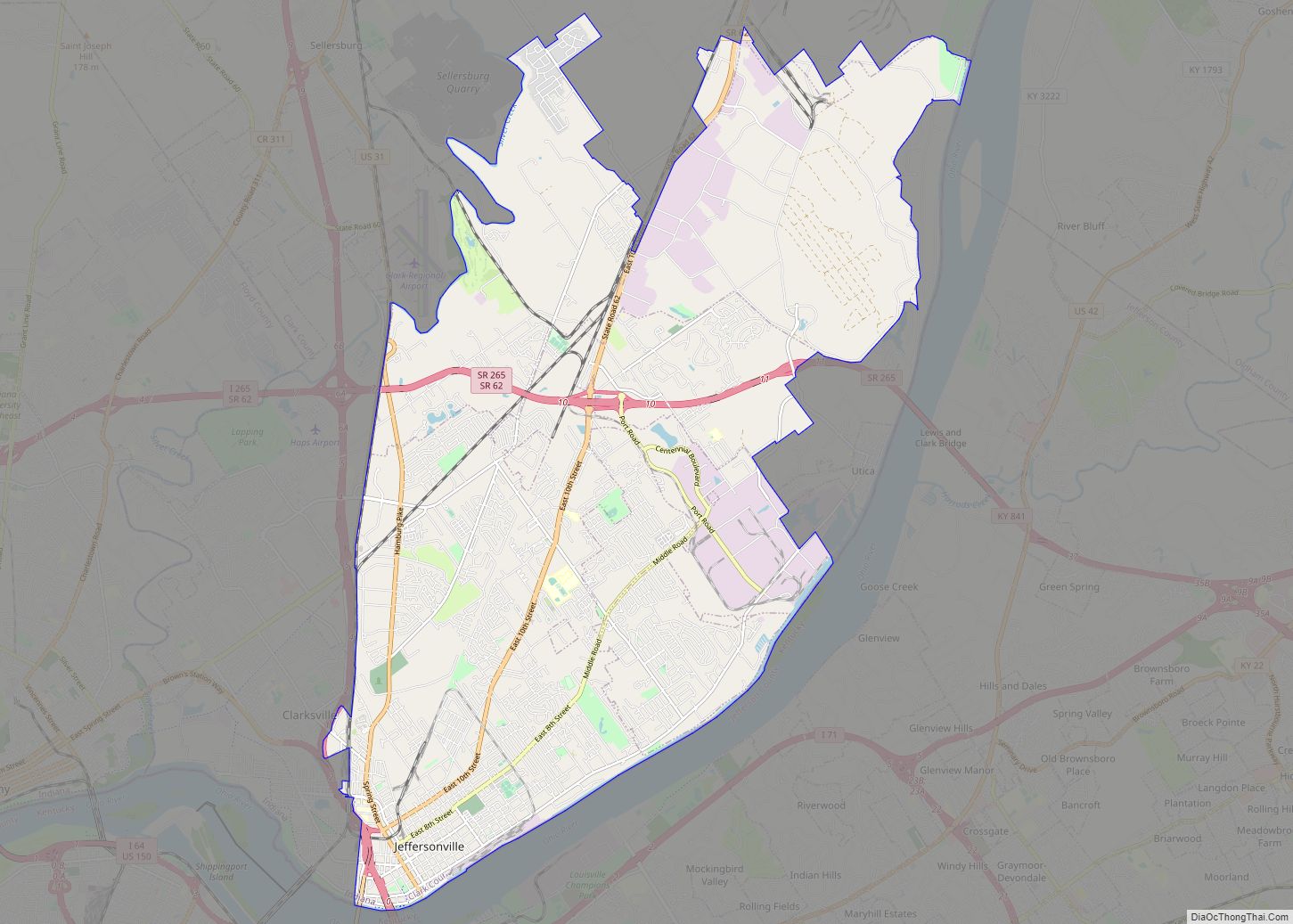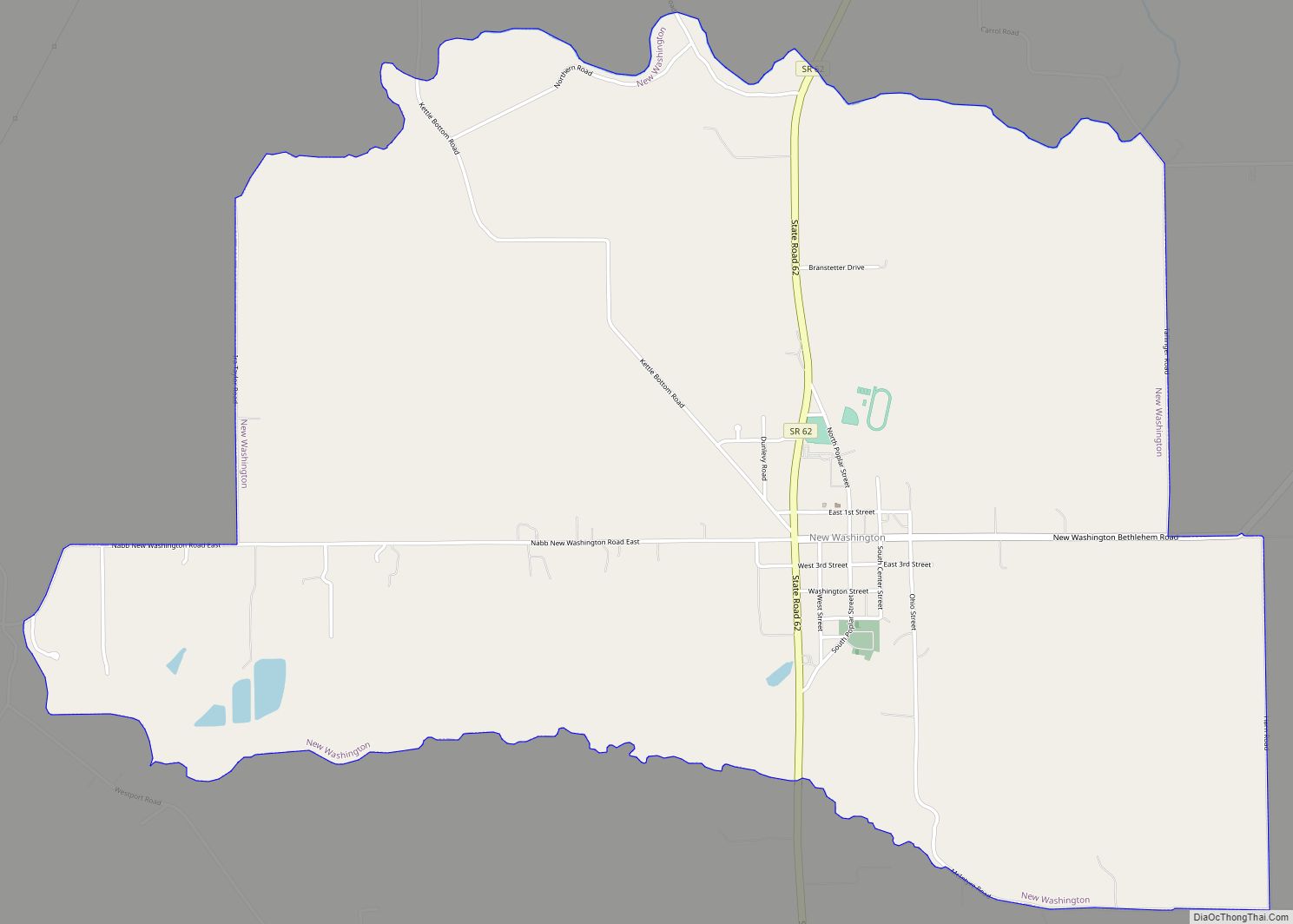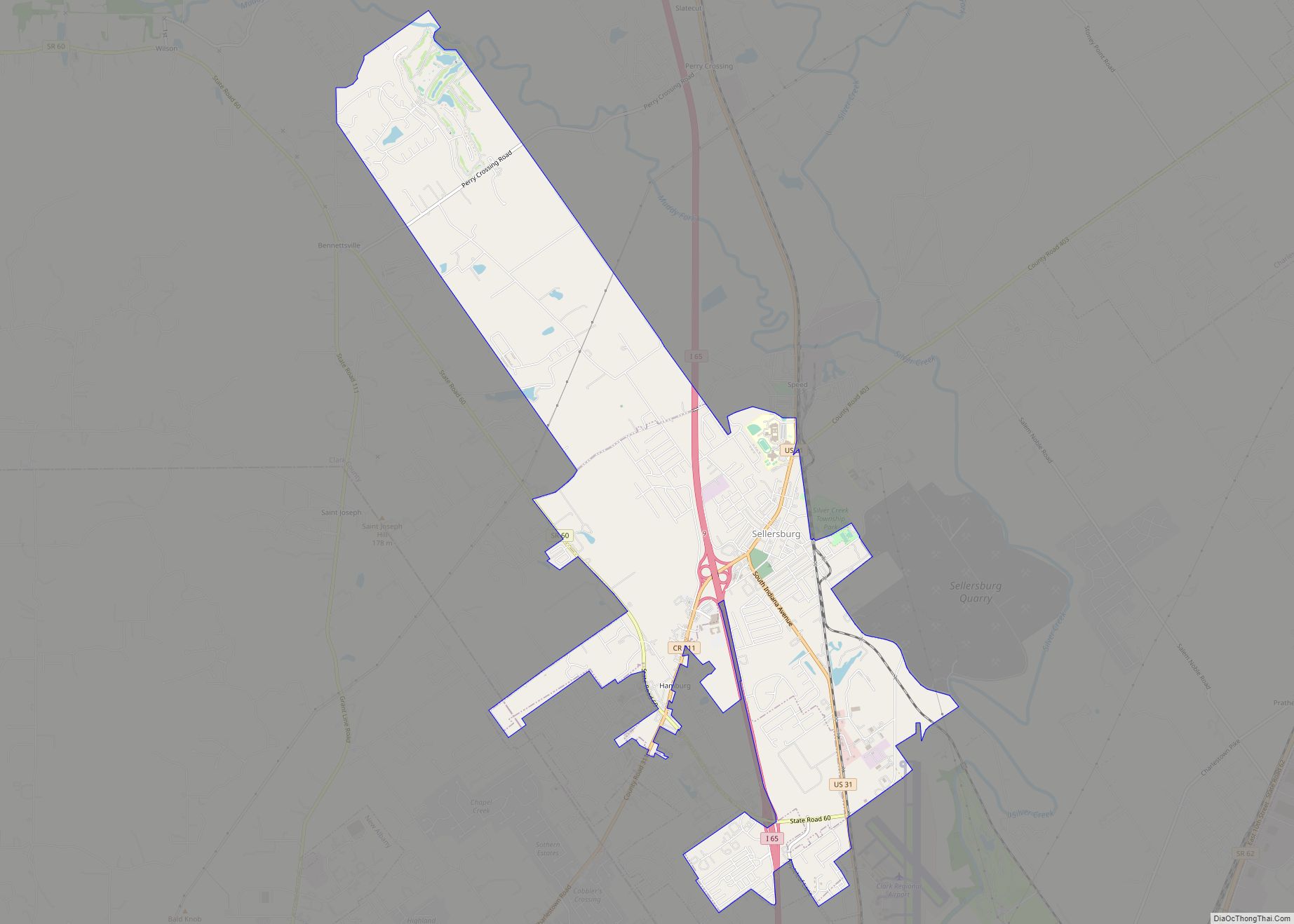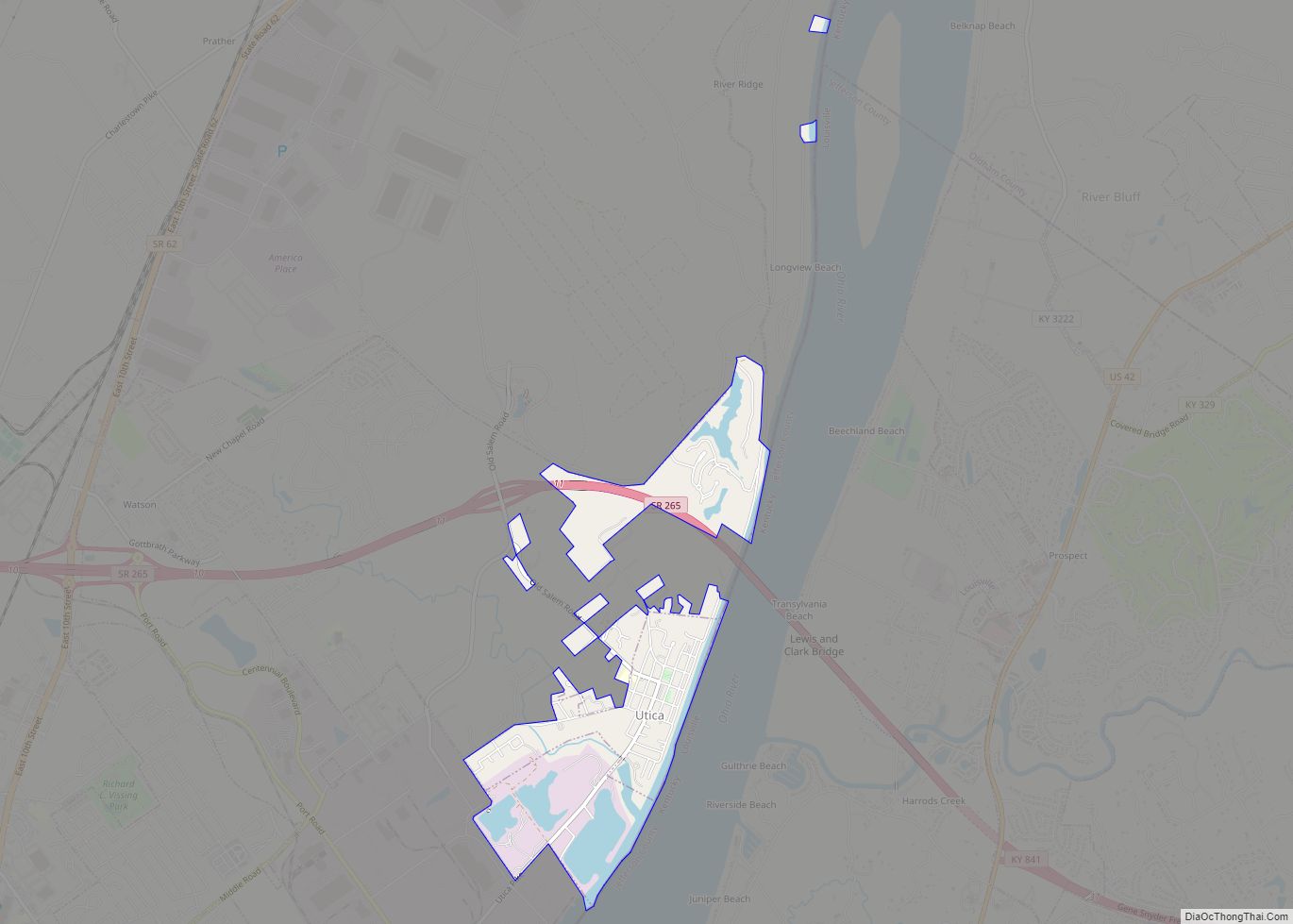Clarksville is a town in Clark County, Indiana, United States, along the Ohio River and is a part of the Louisville Metropolitan area. The population was 22,333 at the 2020 census. The town was founded in 1783 by early resident George Rogers Clark at the only seasonal rapids on the entire Ohio River, it is the oldest American town in the former Northwest Territory. The town is home to the Colgate clock, one of the largest clocks in the world and the Falls of the Ohio State Park, home to the world’s largest exposed Devonian period fossil bed.
| Name: | Clarksville town |
|---|---|
| LSAD Code: | 43 |
| LSAD Description: | town (suffix) |
| State: | Indiana |
| County: | Clark County |
| Elevation: | 456 ft (139 m) |
| Total Area: | 10.23 sq mi (26.51 km²) |
| Land Area: | 10.04 sq mi (26.00 km²) |
| Water Area: | 0.20 sq mi (0.51 km²) |
| Total Population: | 22,333 |
| Population Density: | 2,224.62/sq mi (858.90/km²) |
| ZIP code: | 47129 |
| Area code: | 812 & 930 |
| FIPS code: | 1812934 |
| GNISfeature ID: | 2396649 |
| Website: | www.townofclarksville.com |
Online Interactive Map
Click on ![]() to view map in "full screen" mode.
to view map in "full screen" mode.
Clarksville location map. Where is Clarksville town?
History
The site that would become Clarksville was first used as a base of operations by George Rogers Clark during the American Revolutionary War. In 1778 he established a post on an island at the head of the Falls of the Ohio, from which he trained his 175-man regiment. After the war, Clark was granted a tract of 150,000 acres (610 km) for his services in the war. In 1783, 1,000 acres (4 km) were set aside for the development of a town, Clarksville. The same year a stockade was built and settlement began.
The explorer William Clark was a younger brother of George Rogers Clark. Historian Stephen Ambrose writes of Meriwether Lewis and William Clark in Undaunted Courage, “When they shook hands [at Clarksville], the Lewis and Clark Expedition began.” A two-figure statue near the falls commemorates the expedition. Several localities other than Clarksville claim precedence for the start of the Lewis and Clark Expedition, most notably St. Louis, Missouri.
Due to the many floods in the nineteenth century and the Indiana Canal Company’s failed competition to build a canal around the Ohio Falls, the town struggled. On August 24, 1805 the Indiana Territorial Legislature authorized the construction of a canal around the Falls of the Ohio at Clarksville. The first attempt failed and the investors lost their money. Historians believe it was used to finance the conspiracy of Aaron Burr. Developers tried to build a canal in 1817 and again in 1820. But the race to build the canal was lost in 1826 when the federal government made a large grant to build the Louisville and Portland Canal. The lack of a canal handicapped the growth of the town as the Falls of the Ohio made river transport from the city difficult.
Clarksville became a popular dueling spot for Kentuckians who wanted to dodge their home state’s anti-dueling laws. The most famous of these was the 1809 duel between Henry Clay and Humphrey Marshall. There was an attempt to build a second town within Clarksville’s boundaries, named Ohio Falls City, until the Indiana Supreme Court ruled that this would be illegal.
The town was managed by a ten-member Board of Trustees in the charter from Virginia. The trustees were allowed to align lots along roads and sell the lots for the proceeds to benefit the town. The trustees could elect replacements as needed and did not have to reside in the town. This remained controversial with residents until 1889 when the board stopped meeting and was replaced by a three-member board. One member was selected by the Floyd County Commissioners, one by the Clark County Commissioners, and one by residents of Clarksville. Between 1889 and 1937, the town established a five-member board entirely elected by residents. The historic records related to this governmental change were lost in the Ohio River flood of 1937.
The Great Flood of 1937 decimated the town. The entire town was submerged beneath as much as 12 feet (3.7 m) of water in some areas for over three weeks during January and February. With almost all of the old town destroyed, Clarksville was rebuilt with a new modern city plan.
The post-World War II housing boom and new jobs brought growth to the city. The population increased from 2,400 in 1940 to 22,000 in 2000. The city has expanded to the north by annexing several sizable suburbs. By 1981 the State of Indiana changed statutes to convert the managing board of trustees to a council with members rather than trustees. In 1990 voters approved expansion of members of the Town Council from five to seven following the area growth. Clarksville is now the major shopping hub of Southern Indiana, with the hub area centered on Lewis and Clark Parkway and nearby Veterans Parkway.
Clarksville Road Map
Clarksville city Satellite Map
Geography
Clarksville is located at 38°18′43″N 85°46′2″W / 38.31194°N 85.76722°W / 38.31194; -85.76722 (38.311885, -85.767265).
According to the 2010 census, Clarksville has a total area of 10.17 square miles (26.34 km), of which 9.97 square miles (25.82 km) (or 98.03%) is land and 0.2 square miles (0.52 km) (or 1.97%) is water.
See also
Map of Indiana State and its subdivision:- Adams
- Allen
- Bartholomew
- Benton
- Blackford
- Boone
- Brown
- Carroll
- Cass
- Clark
- Clay
- Clinton
- Crawford
- Daviess
- De Kalb
- Dearborn
- Decatur
- Delaware
- Dubois
- Elkhart
- Fayette
- Floyd
- Fountain
- Franklin
- Fulton
- Gibson
- Grant
- Greene
- Hamilton
- Hancock
- Harrison
- Hendricks
- Henry
- Howard
- Huntington
- Jackson
- Jasper
- Jay
- Jefferson
- Jennings
- Johnson
- Knox
- Kosciusko
- LaGrange
- Lake
- Lake Michigan
- LaPorte
- Lawrence
- Madison
- Marion
- Marshall
- Martin
- Miami
- Monroe
- Montgomery
- Morgan
- Newton
- Noble
- Ohio
- Orange
- Owen
- Parke
- Perry
- Pike
- Porter
- Posey
- Pulaski
- Putnam
- Randolph
- Ripley
- Rush
- Saint Joseph
- Scott
- Shelby
- Spencer
- Starke
- Steuben
- Sullivan
- Switzerland
- Tippecanoe
- Tipton
- Union
- Vanderburgh
- Vermillion
- Vigo
- Wabash
- Warren
- Warrick
- Washington
- Wayne
- Wells
- White
- Whitley
- Alabama
- Alaska
- Arizona
- Arkansas
- California
- Colorado
- Connecticut
- Delaware
- District of Columbia
- Florida
- Georgia
- Hawaii
- Idaho
- Illinois
- Indiana
- Iowa
- Kansas
- Kentucky
- Louisiana
- Maine
- Maryland
- Massachusetts
- Michigan
- Minnesota
- Mississippi
- Missouri
- Montana
- Nebraska
- Nevada
- New Hampshire
- New Jersey
- New Mexico
- New York
- North Carolina
- North Dakota
- Ohio
- Oklahoma
- Oregon
- Pennsylvania
- Rhode Island
- South Carolina
- South Dakota
- Tennessee
- Texas
- Utah
- Vermont
- Virginia
- Washington
- West Virginia
- Wisconsin
- Wyoming
